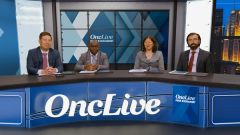
Combination Therapy Approaches With Chemotherapy and Immunotherapy in ES-SCLC
Panel experts discuss strategies aimed at preventing and managing potential adverse events with first-line combination therapy approaches in extensive stage small-cell lung cancer.
Episodes in this series

Transcript:
Taofeek K. Owonikoko, MD, PhD: Dr Leventakos, let me come back to you in terms of the design of these 2 trials, IMpower133 and CASPIAN, as well as the other chemoimmunotherapy using trials using cemiplimab and anti–PD-1s. The design has resulted in positive outcomes with concurrent chemotherapy and immunotherapy followed by maintenance. It’s difficult to tease apart how much of the benefit is from the maintenance and how much came from the concurrent administration. We want to make sure that a patient will be able to tolerate both the concurrent as well as the maintenance [therapy]. Have you had any challenges with the use of maintenance durvalumab or maintenance atezolizumab? And if you do, what are the most pressing challenges that you think you have to help the patient through?
Konstantinos Leventakos, MD, PhD: As thoracic oncologists, we are giving chemotherapy all the time. So we have become immunotherapy specialists. I haven’t seen the addition of immunotherapy in the treatment of [patients with small-cell lung cancer] as more challenging than the addition of immunotherapy in [the treatment of] patients with non–small cell lung cancer. My experience is that at the time of the concurrent treatment with chemoimmunotherapy, most of the symptoms usually are chemotherapy driven, with classic [adverse effects such as] fatigue, nausea, and vomiting, but I think we have mastered symptom control. My experience is that most of the patients, especially the symptomatic ones, start feeling better once we start the treatment with chemoimmunotherapy. But when it comes to the adverse effects of the durvalumab, of course, we have the immune adverse event that we see many times, especially thyroid issues, and most of the time it’s a laboratory finding before the patient has symptoms. We also have cases of pneumonitis or colitis, but [those are] actually quite low numbers, in my experience within the studies. Some patient-reported symptoms are fatigue, which I see a lot, and sometimes skin rashes or itchiness, but I think, overall, I have not found the management very challenging. It’s very well tolerated, of course, because we’re talking about immune adverse effects that do not always follow the timing that we all know chemotherapy adverse effects follow. I think a very important thing, especially when we’re talking about dangerous immune adverse effects is to have a very good plan for communicating to the team once they have something that doesn’t look right…. I tell my patients, "We don’t have Friday night, we don’t have Saturday; we don’t have Sunday. You call us anytime; never wait for the weekend to tell us that you have diarrhea or shortness of breath." Early identification of adverse effects is really what makes the difference in keeping them safe.
Taofeek K. Owonikoko, MD, PhD: That’s actually a good approach. Maybe I will use that technique with my patients as well; no weekends. [LAUGHTER]
Konstantinos Leventakos, MD, PhD: And usually say my pager works forever even though someone else is covering. [LAUGHTER]
Taofeek K. Owonikoko, MD, PhD: It’s always good to find jobs for your colleagues.
Transcript edited for clarity.





































